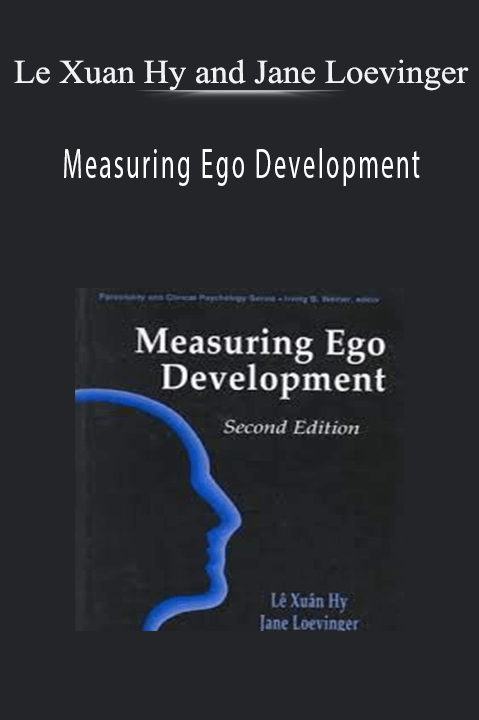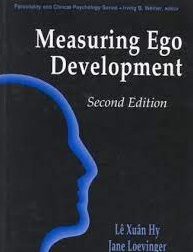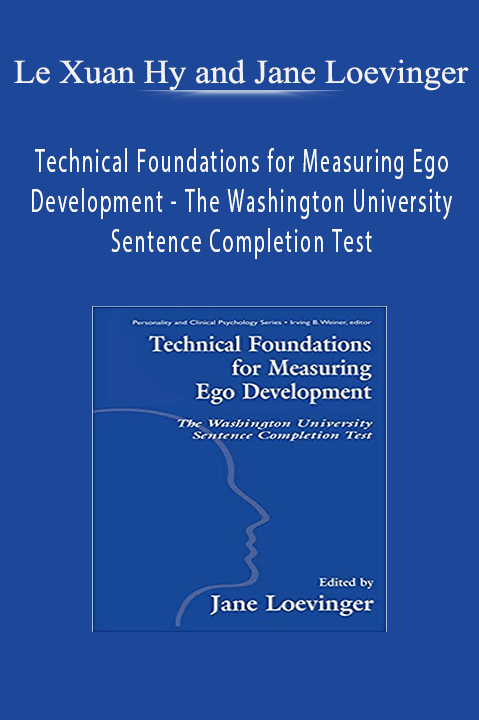Le Xuan Hy and Jane Loevinger – Measuring Ego Development
The topic of ego development developed when psychoanalysis did not fulfill all the initial hopes during its early period of prominence. Clinicians–psychiatrists, psychologists, social workers, and counselors–realized that they needed to know more than their patients’ or clients’ psychopathology or normalcy and their psychosexual behavior and drives.
The method for scoring sentence completions presented in this manual was originally developed for a study of women and adolescent girls. By the time it was first published in 1970, however, the method had already come into use in studies of men and boys. Since then, it has been used with widely varying samples, and the test has been translated into several other languages. This wide adoption testifies to the need for such a test. The present version of the manual incorporates three major improvements:
* it is based on data from, and is intended for use with, both males and females,
* its format is easier to use, and
* the examples cited reflect current public attitudes.
The format of the scoring manual for the Sentence Completion Test (SCT) is radically changed from the original, making it easier to find the correct rating for a response. The rating scale itself is kept simple and the basic concept of ego development is the same. A tutorial is included to assist in calculating the Total Protocol Ratings (TPRs).
ALTERNATIVE BLURB!!!
The Washington University Sentence Completion Test, which was developed by Jane Loevinger, is a free-response, semi-projective instrument for the assessment of ego development. The first manual for administering and scoring the test was published in 1970. In addition to its widespread use in the United States, it has also been adopted for use in Canada, the United Kingdom, France, Germany, Italy, the Netherlands, Japan, India, and South Africa. The WUSCT has been used for research in the fields of adolescent personality development, moral development, infancy and parenting, family and gender studies, multiculturalism, religion, psychopathology and psychotherapy, vocational studies, and social and organizational psychology. It is most frequently used by researchers and practitioners in psychology, counseling, social work, and education.
This book represents a revised edition of the WUSCT scoring manual, including all items in the 1981 forms, which were revised for use with both men and women. The content reflects current social attitudes, which have changed on some topics since the publication of the original 1970 manual. Although there have been minor changes in terminology, the conception of ego development is unchanged, and the stages of the construct are essentially the same. The format of the scoring manual, however, has been radically changed for ease of use in rating responses. (The rating scale itself, which is the same for all items, is kept simple.) A tutorial is included to assist in calculating the Total Protocol Ratings.
Get Download Le Xuan Hy and Jane Loevinger – Measuring Ego Development at Offimc.click Now!
Delivery Information
- Upon ordering the product, a delivery email with download instructions will be sent immediately to you so that you may download your files. If you log in (or create an account) prior to purchase you will also be able to access your downloads from your account dashboard.
- It is a digital download, so please download the order items and save them to your hard drive. In case the link is broken for any reason, please contact us and we will resend the new download link to you.
- If you don't receive the download link, please don’t worry about that. We will update and notify you as soon as possible from 8:00 AM – 8:00 PM (UTC+8).
- Please Contact Us if there are any further questions or concerns you may have. We are always happy to assist!









11 reviews for Measuring Ego Development – Le Xuan Hy and Jane Loevinger
There are no reviews yet.